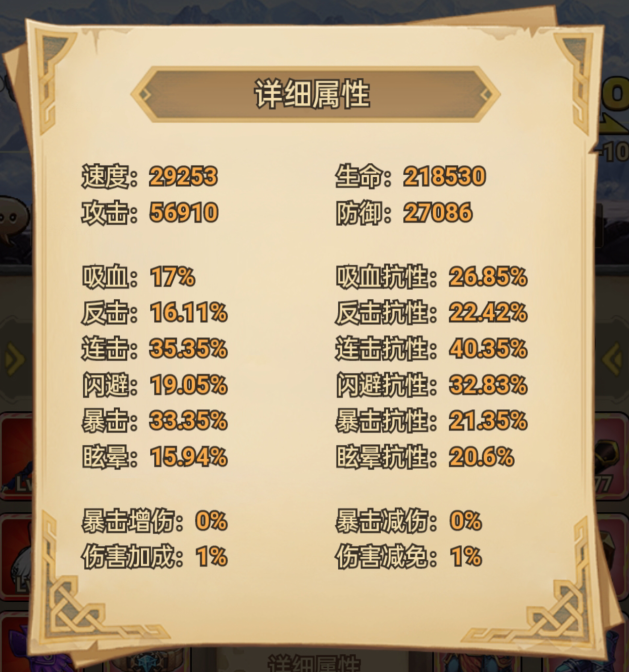Home >Mobile Game Tutorial >Mobile Game Guide >Introduction to the attribute system of 'Dragon Song Continent'
Introduction to the attribute system of 'Dragon Song Continent'
- WBOYWBOYWBOYWBOYWBOYWBOYWBOYWBOYWBOYWBOYWBOYWBOYWBOriginal
- 2024-07-19 12:55:511193browse
Question: How does the attribute system in "Dragon Song Continent" affect the game experience? Brief description: "Dragon Song Continent" is an idle development adventure game, and its attribute system is crucial to the character's combat performance. Guided reading: PHP editor Banana provides an in-depth analysis of the attribute system of "Dragon Song Continent" to provide players with a comprehensive interpretation. The next paragraph will detail the base attributes, including speed, health, attack, and defense, and their role in turn-based combat.

Introduction to the attribute system of "Dragon Song Continent"
1. Basic attributes
Basic attributes include our four most common ones: speed, life, attack, and defense. In turn-based battles, speed determines the order of attacks and also means the initiative to attack first, which can be said to be a very critical attribute.

2. Blood-stealing and blood-stealing resistance
The percentage of blood-stealing attributes represents the probability of successful blood-stealing, while the percentage of blood-stealing resistance represents the probability of preventing the enemy from inflicting blood-sucking effects on us.
3. Counterattack and Counterattack Resistance
The percentage of counterattack attribute represents the probability of successfully counterattacking after being attacked by the enemy, while the percentage of counterattack resistance represents the probability that the enemy cannot counterattack after attacking us.
4. Combo attack and combo resistance
The percentage of combo attribute represents the probability of continuous attacks when attacking the enemy, while the percentage of combo resistance represents the probability that the enemy will not be able to produce combo attacks when attacking us. Probability.
5. Dodge and Dodge Resistance
The percentage of the dodge attribute represents the probability of successfully dodging when attacked by the enemy, while the percentage of dodge resistance represents the probability that we cannot be dodged after attacking the enemy. In other words, it is hit rate
6. Critical hit and critical hit resistance
The percentage of critical hit attribute represents the probability of critical hit damage when attacking the enemy, while the percentage of critical hit resistance represents the enemy's attack The probability that critical damage will not occur when on our side.
7. Stun and Stun Resistance
The percentage of the stun attribute represents the probability of causing a stun state (ie unable to move) when attacking the enemy, while the percentage of stun resistance represents the probability of the enemy attacking me The probability of being unable to cause a violent stun state.
8. Critical hit damage increase and critical hit damage reduction
The percentage of critical hit damage increase attribute represents the additional damage added when attacking the enemy to cause critical hit damage, while the percentage of critical hit damage reduction represents the enemy's damage to us After causing critical damage, the damage we can reduce.
9. Damage Bonus and Damage Reduction
The percentage of the damage bonus attribute represents the additional damage added when attacking the enemy to cause damage, while the damage reduction percentage represents what we can do after the enemy causes damage to us. Damage reduced.
Adventurers can freely match their attributes to improve their combat power
The above is the detailed content of Introduction to the attribute system of 'Dragon Song Continent'. For more information, please follow other related articles on the PHP Chinese website!
Related articles
See more- 'Honor of Kings' Bull Demon Skin Ben Lei Shen Envoy Return Time Introduction
- 'Honkai Impact: Star Rail' Guide to Obtaining the Impermanence Achievement
- Introduction to NPC preferences in 'Small Life'
- 'Text Finds Differences' helps students to pass the level when asking for leave
- The King of Chinese Characters: Matching Pig Parts and Clearance Strategy

